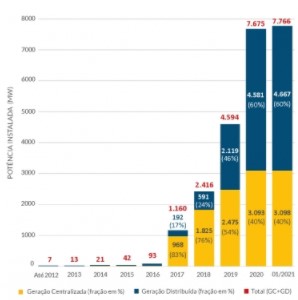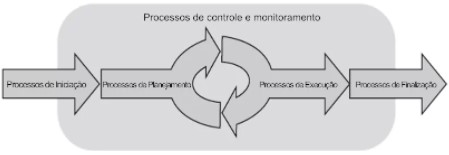With the growth of the solar energy market and the number of companies in this sector, the implementation of good project management is essential to increase the ability to meet market demands with excellence, given this competitive scenario. Competitiveness is the key word to encourage the search for improvement not only of the team, but also of the processes in which everyone in the company is involved, from the moment of capturing leads to the completion of after-sales, a stage in which the customer ends up being loyal. The photovoltaic sector has consolidated itself as the fastest growing segment in Brazil and companies concerned with continuous improvement and customer service with added value will have their results maximized in relation to their competitors. Regardless of the size of the solar energy project, it is necessary to apply the project management methodology, with techniques and tools that make customers and investors feel supported by a company that demonstrates efficiency throughout its value chain.
The evolution of photovoltaic solar sources in Brazil
According to data from ABSOLAR (Brazilian Photovoltaic Solar Energy Association), to date we have more than 7 gigawatts (GW) of operational power, considering centralized generation and distributed generation, as shown in Figure 1.

These data, which represent important milestones, are essential to demonstrate the growth of this renewable source in the country. Another important factor associated with this evolution was the reduction in the price of solar generation. In the last 10 years there has been a brutal drop in the prices of photovoltaic equipment, which helped to boost the sector, combined with government subsidy programs, sustainability awareness and the opening of new lines of financing that allowed the inclusion of low-income populations in energy. solar. Despite the pandemic, the photovoltaic sector proved to be very resilient, with the number of installations growing in Brazil. The evolution of the photovoltaic solar source became a driver for competitiveness in the sector that generated more than 233 thousand jobs in the country.
When does the need to apply a project management methodology arise?
There are those who think that project management is something “new”. However, the essence of project management has existed for thousands of years, if we think about how the planning, administration and execution of the construction of historic monuments around the world took place. Planning, in particular, which is the crucial point of any project, often ends up being neglected. Modern project management was consolidated with PMI (Project Management Institute) which produced the PMBOK guide (Project Management Body of Knowledge) providing information on process groups, knowledge areas, tools and techniques for project managers around the world. According to the PMBOK's own definition, “a project is a temporary effort undertaken to create a unique product, service or result”. This definition occurs because the effort is restricted by scarce resources, with a life cycle, that is, with a beginning, middle and end. There is an emphasis on the result as it is necessary to define at the beginning what the objective of the project is, observing the scope, requirements and restrictions and assumptions, among other aspects. Therefore, when executing a solar energy project, the phases (groups of processes) that the project will need to be carried out successfully must be observed, and these are represented in the Figure 2.

Initiation: Group of processes to start the project, paying attention to all the information that will guide the development and closure of the project. Planning: Group of processes inherent to the use of tools and techniques to define how, when and by whom the project will be carried out. Execution: Group of processes that ensure that execution will be carried out as planned. Monitoring and control: Constant process group throughout the project – after all, what is not measured, is not managed. Finishing: Group of processes designed to close the project, one of the most important stages for the team and portfolio management. The need to apply the project management methodology arises with the initiation of the project itself and is essential. It is through this application that it becomes possible to execute successfully, providing excellent service to clients and investors. The PMBOK methodology also indicates 10 areas of knowledge, that is, 10 different aspects of any project, which must be worked on throughout the project, namely:
- Integration Management;
- Scope Management;
- Schedule Management;
- Costs management;
- Quality management;
- Acquisitions Management;
- Risk management;
- Resource management;
- Communication Management;
- Stakeholder Management.
But, after all, how to apply project management strategically?
Professional team training is a crucial factor in the success of companies. The project management perspective allows for a more strategic vision, guaranteeing high performance in relation to competitors who seek to “do things”, that is, the execution of activities without planning. Given this scenario, it is worth evaluating:
- What is the objective of the project? We must describe the objective intelligently and completely, as it is what will guide the project.
Example: Implement a solar photovoltaic plant of X MW, by month Y, in place X, in the state of SP, to generate savings of X%.
- What is the justification for the project? How important is this project? What need will it solve?
Example: University X wishes to promote sustainability and economy, aiming to influence students and employees with the implementation of this plant.
- What are the project constraints? What can't happen? These are factors that, if not observed, can cause idleness and consequently losses.
Example: The execution cannot take place during class periods.
- What are the project premises? What can we adopt as true, but we will only discover throughout the project if it really is? In this case, for each premise it is necessary to adopt a form of mitigation.
Example: University X will provide an unimpeded area to work.
- What are the project risks? What can we predict in all spheres? How are we going to classify these risks? How will we mitigate them?
Example: Economic, social, technical, hydrological, environmental risks, etc.
- What are the project milestones? What are the deliverables? We must think about “packages” of work being delivered over time and these can even be linked to the contract and the physical financial schedule.
Example: Delivery of the executive project, installation of all photovoltaic modules.
- Who will be involved in the project? Is the team outsourced or in-house? What is each person’s role and responsibility in the project?
Example: Fulano – installer, Beltrano – designer.
- What is the project budget? Remember that cost price is not sales price.
Example: Give your team the budget (monetary value) of inputs and labor expected for execution, constantly monitor and control, propose bonuses based on savings of this value.
- What are the project scope exclusions? It tends to cause concern about telling the team what to do, but it is also important to transmit information about what is not part of the scope.
Example: An EPCista contract provides for the laying of cables for a team, but they were not hired to dig the trenches. Therefore, there is a failure to detail the scope. If not listed at the beginning of the project, these scope exclusions, depending on the location of the photovoltaic solar plant, will result in losses and delays, especially if the activity is a predecessor. Companies stand out in the market due to their ability to respond quickly to changes, innovation, agility in decision-making and commitment to deadlines for their deliverables.
Conclusion
The implementation of project management enables high performance for companies, making them capable of meeting the expectations and needs of increasingly demanding customers and investors. The complexity of executing solar energy projects, in terms of managing deadlines, costs, quality, human resources, communication, risks, acquisitions, interested parties and other areas, simultaneously, requires the application of methodologies with appropriate tools and techniques to project management.

















10 Responses
Excellent article, extremely relevant! Congratulations!
CONGRATULATIONS*
What rich material. Congratulations Tati. Success in your career.
Great article
I would like to receive contacts for work in the area
Wonderful!
Well explained article that highlights the importance of project management in any company in the sector, whether large or small!
Well-executed management is the key to executing quality works, within budget, and on time!!!
Excellent article, I have the pleasure of meeting the author and getting to know all the techniques used in this article, and day after day I learn more and see that without great management, no project can go ahead and end successfully! Congratulations Tatiane, always showing your ability and professionalism!!
Congratulations on the post, dense and quality content!
Tati rocks!!
Very good text!! It's surprising how there are people like you with the gift of conveying content that is often complex in such a simple and didactic way. Excellent content, congratulations to the writer and CanalSola!!
I found this explanation super educational, it resolved several doubts I had and only made me even more eager to specialize in this area of management!
Congratulations on the intuitive way and simple language you used…
Great article, congratulations Tatiane and Canal Solar, always adding to the market